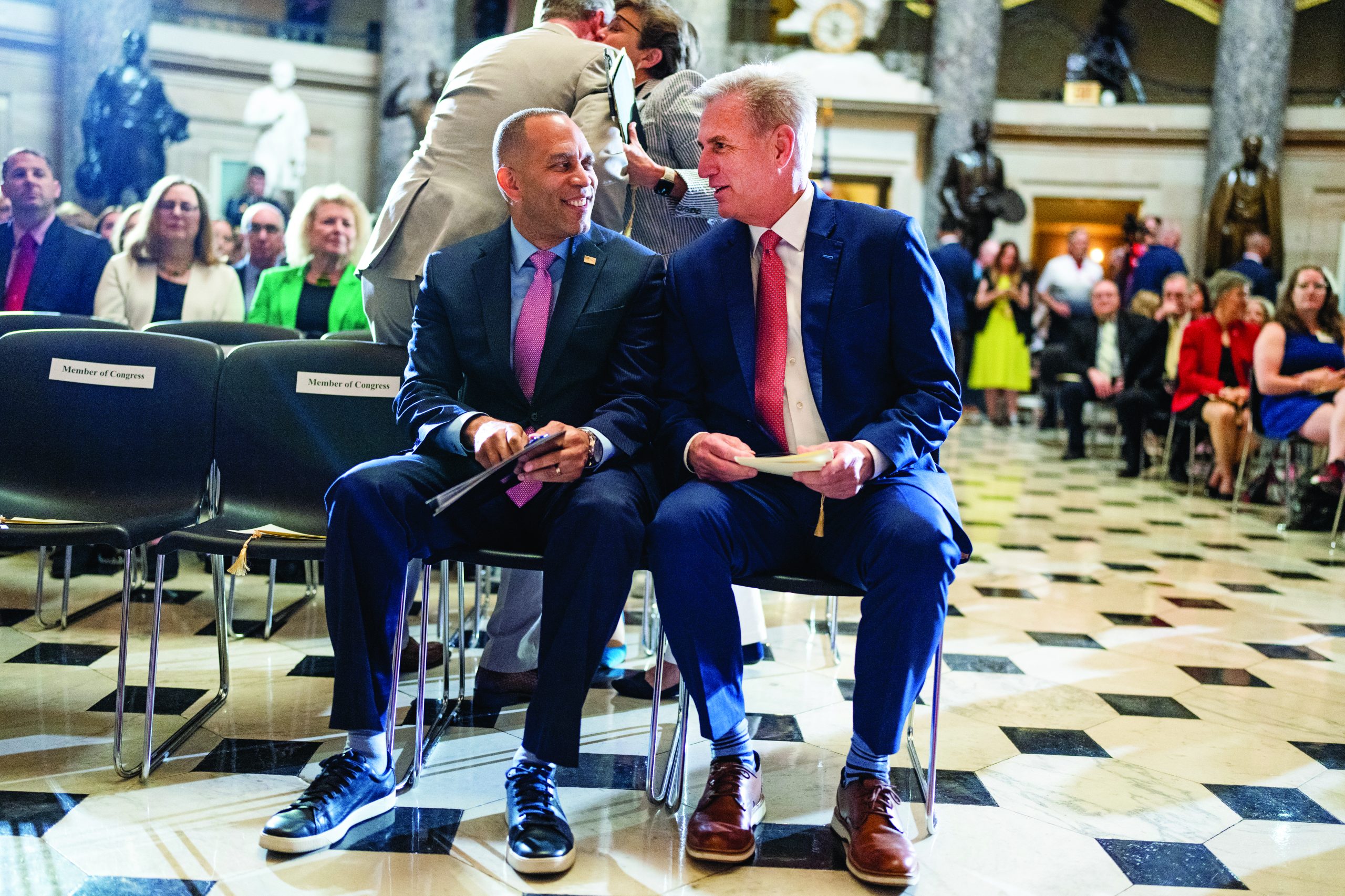YOUNGSTOWN, Ohio — House Speaker Kevin McCarthy (R-CA) is at his fifth of seven stops here in the Buckeye State in a span of two days. He’s on a mission not just to raise money for Republican House members but to kick some tires as he recruits candidates: Who are these men and women who want to run for the House in 2024, and what do they bring to the table?
“I’ve been doing recruiting since 2010,” McCarthy told the Washington Examiner on the trail. “The one thing I learned is: Don’t just go with what’s on paper about someone, and don’t go with what somebody in Washington tells you about someone. You have got to get into the district and talk to the candidate and the people.”
MCCARTHY DOING BETTER JOB AS SPEAKER THAN INITIAL EXPECTATIONS, STAFFERS SAY
The fourth-generation Californian says he has to see for himself — and so do the voters. The right candidate must be someone who has built relationships with the district he or she seeks to represent. It can’t just be “someone they just met last week,” he said.

The deciding factor in whether he’ll support candidates, though, is how they answer one question: Why do you want to run?
“It is their ‘why’ that determines a lot,” he said. “If they don’t have the ‘why,’ I don’t care how good you are or how much money you have, you will not win.”
Six months after going through the very public, very dramatic, 15 rounds of voting by House members to become speaker, a vote filled with tense negotiations with a hard-line set of conservative lawmakers, McCarthy has emerged as speaker largely underestimated, which has worked to his advantage so far.
“Yeah, that bothered me as you’re going through it, but it’s made me stronger in the sense it made me a better speaker,” said McCarthy, who was once turned down for an internship for the very Bakersfield, California, House seat he holds today.

In addition to learning from his own experiences, he seeks to learn from those of others. McCarthy said he has reached out to former speakers for advice, including Newt Gingrich, who led the Republican Revolution of 1994 and made the GOP a legislative power opposite Democratic President Bill Clinton. “I always believe in continuing education,” he said, adding that Republican leaders are constantly on the search for the right formula that will earn the public’s trust and keep them in power long enough to have an impact. “If you look at it, Republicans have only ever won the majority five times in the last 100 years. One time we kept it for 12 years. One time we kept it for eight years.”
As soon as he took the gavel, McCarthy said he began what he calls a “restructure” of the House that included ending proxy voting, a practice introduced by Democrats during the pandemic, removing the magnetometers, and finally, after years of demanding transparency around the legislative process, requiring that lawmakers receive the text of bills 72 hours ahead of a vote.
All were part of the handshake deal McCarthy made with the conference in order to secure the speakership, plus including more right-wing members on committees, in order to give that wing of the party a say in policy and the process.
McCarthy said the committees are now “a microcosm of the philosophy of the conference,” pointing to Freedom Caucus members on the Rules and Steering committees, “because when I looked around, I saw who wasn’t represented. Now everybody has a voice.”
McCarthy’s tenure began after a disappointment for the party: The GOP was predicted by many to gain a solid majority of up to 30 seats in the 2022 midterm elections. That “red wave” never materialized, and his party holds the House majority by fewer seats than there were holdouts in his own caucus when he ran for speaker. But McCarthy is still optimistic.
“We are now passing bills with a five-seat majority that we could never pass when we had a 30-seat majority,” said McCarthy, who added that he saw Republicans squander huge majorities, and for two years the presidency with it, without being able to pass transformational legislation. “Border security, we couldn’t do it. Debt ceiling, we threw everything at it — we couldn’t do it. So sometimes when you have to be more focused, you become better,” he said.
There were two ways to interpret McCarthy’s protracted battle for speaker. One way was to see it as confirmation McCarthy was beholden to the most uncompromising faction of his caucus, which would make it impossible for him to make any deal with President Joe Biden and the Democrats that would entail concessions, especially on spending. The other and less common way to interpret it was that McCarthy possessed the patience to see what his caucus would concede without derailing the deal. That latter interpretation received a boost when McCarthy headed into his first major test as speaker: negotiations with Biden to raise the debt limit.
Democrats were so dismissive of McCarthy’s ability to wrangle enough support in the House for a debt ceiling bill that they centered their talking points on McCarthy’s failure. When he got a bill through the House, Democrats were caught so off guard they continued pushing the same talking points even after McCarthy and the GOP made them irrelevant.
“No one ever thought I could get a debt ceiling bill passed,” McCarthy said. “The president said he wouldn’t negotiate with me. But here is the thing in the House: While he wasn’t negotiating, we were. For months, we were talking together.”
“And it’s not like [with a debt limit bill like this] you get to have an amendment when you get to the floor to try to fix something, to get somebody to vote for it,” he said. “You’ve got to start working out the problems early,” anticipating objections and putting together a bill that can pass once it hits the floor.
McCarthy is a bibliophile with a particular appetite for books on history and perseverance. He said he is also hard-wired to work to bring people together. His goal with any legislation, then, is twofold, according to the speaker: pass a bill that helps the public and involves enough participation by both sides to turn down the partisan temperature in the chamber.
McCarthy said that even before he was elected speaker, he would meet with his Democratic counterpart, Rep. Hakeem Jeffries (D-NY). “I told him I’m going to treat you the way I wanted to be treated when I was minority leader. Everything doesn’t have to be partisan, and there’s certain issues we really need to work together on,” he said.
That has helped the two build mutual respect — essential when they’re butting heads on policy. “That doesn’t mean he’s not going to fight with me on policy — it happens every day. I do it, too. But the first thing I told him, even when I won the speaker’s vote and I jokingly said to him, ‘Hakeem, I just want to warn you, two years prior, I got 100% of my conference, too,’ I also told him, ‘I will never attack you personally. We are going to debate, we’re going to argue, but it will never be a personal attack. It’ll only be about the issue,’” McCarthy said.
When McCarthy wants to talk to Jeffries, he doesn’t hand the task off to an aide. “I just text and call him directly.”
Their relationship was tested immediately. In 2021, Democrats voted to remove controversial bomb-throwing Rep. Marjorie Taylor Greene (R-GA) from her committee assignment. Troubled by the behavior of two Democrats on the House Intelligence Committee, Reps. Adam Schiff (D-CA) and Eric Swalwell (D-CA), who were seen as politicizing or mishandling intelligence, McCarthy intended to do the same. He told Jeffries immediately. “I sat down and said, ‘Look, I’m going to remove these two people from the Intel Committee, Swalwell and Schiff. You’re going to think it’s all political reasoning, but I want to tell you, I think the Intel Committee is broken,” he said.
McCarthy explained: “I want the Intel Committee to work together. This is not a place for politics. This is a place that sees things that other people can’t, and we have to speak with one voice when we’re looking at our adversaries.”
McCarthy said the move proved the committee could put politics aside. When a Chinese spy balloon was discovered over U.S. territory, McCarthy wanted to tamp down the finger-pointing. Some in his caucus wanted to pass a resolution that sent a message to the Biden administration’s handling of U.S. security. But McCarthy wanted to send a message to Beijing instead. “So Hakeem and I talked together, we put a resolution on the floor, and every single member of Congress voted for it.”
McCarthy’s desire to bring the parties together and reduce the partisan static in the House has led to some out-of-the-box thinking. “I’m going to do a county fair on the lawn of the Capitol,” McCarthy said. “Ferris wheels, I got games. It’s for everybody. If you are a member of Congress or you work here, you’re going to come, bring your family.”
And unlike other friendly congressional competitions, McCarthy doesn’t even want the two parties pitted against each other at the fair. “It’s going to be a Republican and Democrat on one committee versus a Republican and Democrat on the other committee. And the thing they’re not going to realize is that they’re working together. They’re going to have fun. They’re going to have their families together,” he said.
CLICK HERE TO READ MORE FROM THE WASHINGTON EXAMINER
So if the whole speaker thing doesn’t work out, I ask, is he going to become an event planner? McCarthy laughs, then rattles off a few more ideas, such as movie nights for members and their families, bringing in authors for a book night, and the like.
He’s even got one in mind: Angela Duckworth, author of Grit: The Power of Passion and Perseverance. It’s a theme for the man who persevered through 15 rounds of voting to get the speaker’s gavel. “You know, I have created my whole speakership around that term, grit.”
Salena Zito is a national political reporter for the Washington Examiner.
